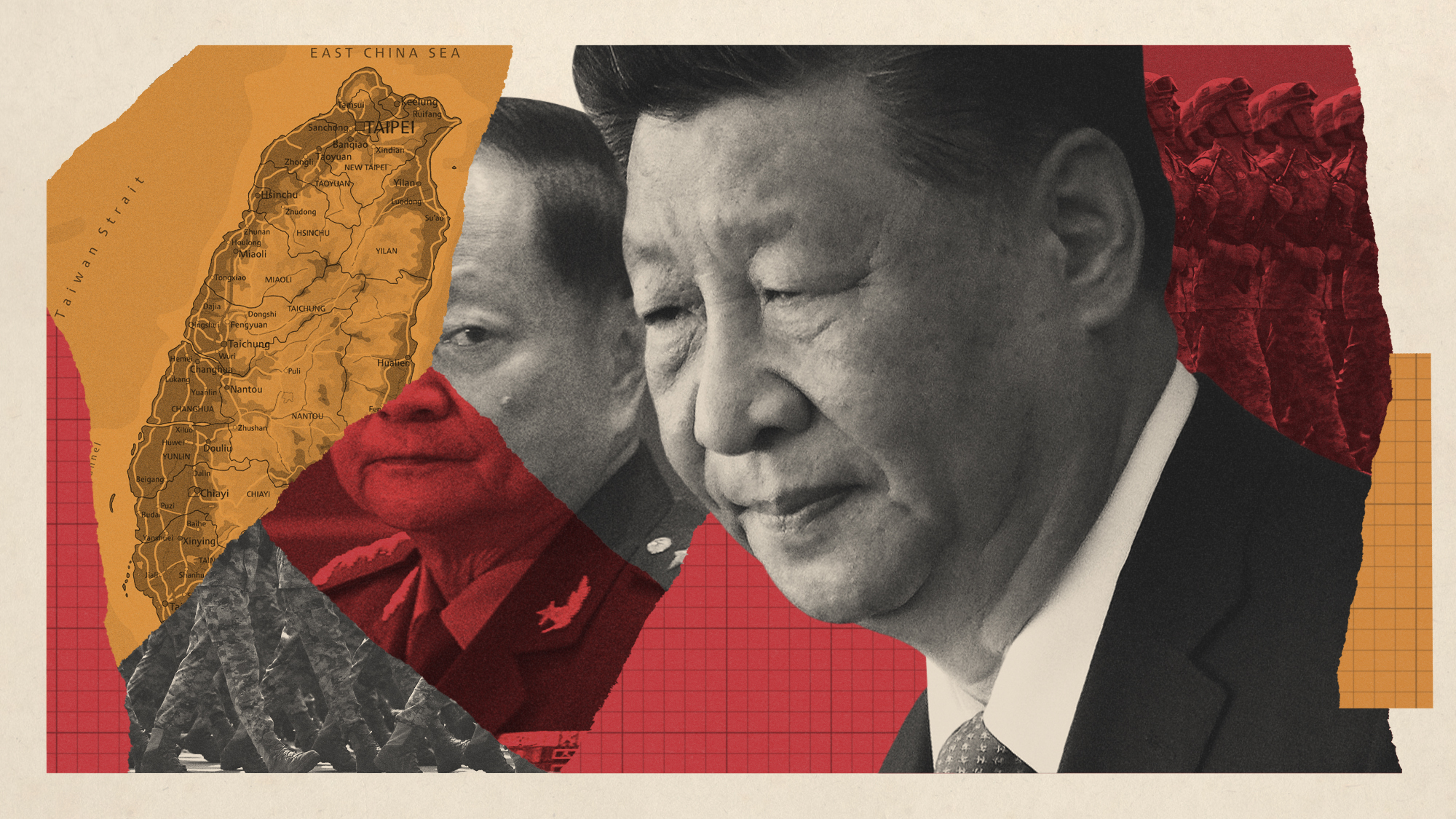Troubled waters: The Navy is struggling to build warships
Reports indicate that China's shipbuilding capacity is over 200 times that of the US


A free daily email with the biggest news stories of the day – and the best features from TheWeek.com
You are now subscribed
Your newsletter sign-up was successful
While the United States Navy is still considered the most powerful on Earth, there is concern among military officials that the Navy's longstanding prowess in building warships is sinking. Some experts now believe that the Navy's shipbuilding is in its worst state in 25 years, allowing the Chinese Navy to leapfrog some of the naval fleet capabilities of the U.S.
Leaked intelligence seen by Business Insider reportedly shows that China's shipbuilding capacity is 232 times greater than the United States, a far cry from America's oceanic dominance of years past. And some are concerned that the Navy's shipbuilding problems could be here for the long run.
Why is the US Navy having trouble building ships?
One of the biggest hindrances is an ongoing "struggle to hire and retain laborers for the challenging work of building new ships as graying veterans retire," said The Associated Press. This labor shortage is "one of myriad challenges that have led to backlogs in ship production and maintenance," in addition to "shifting defense priorities, last-minute design changes and cost overruns" that have caused Navy shipbuilding to lag.
The Week
Escape your echo chamber. Get the facts behind the news, plus analysis from multiple perspectives.

Sign up for The Week's Free Newsletters
From our morning news briefing to a weekly Good News Newsletter, get the best of The Week delivered directly to your inbox.
From our morning news briefing to a weekly Good News Newsletter, get the best of The Week delivered directly to your inbox.
Part of the problem lies with the Navy itself, which "frequently changes requirements, requests upgrades and tweaks designs after shipbuilders have begun construction," said the AP. This has notably occurred with the Navy's new Ford-class aircraft carriers. The third ship in that line, the USS Enterprise, was expected to be completed "in the spring of 2028, but supply chain issues and shortages in necessary materials have caused an 18-month delay, pushing the delivery date to September 2029," according to The National Interest. The line's namesake, the USS Gerald R. Ford, also saw several delays before it was completed in 2017.
This causes funding issues that have "disrupted the cadence of ship construction and stymied long-term investments and planning," Matthew Paxton of the trade group Shipbuilders Council of America said to the AP. The council has been "dealing with inconsistent shipbuilding plans for years," and "when we finally start ramping up, the Navy is shocked that we lost members of our workforce."
What does this mean for the world's military order?
For now, the United States Navy is "still widely considered to be the world's most powerful," said Business Insider, and "then-U.S. Secretary of Defense Mark Esper said in 2020 that even if the U.S. were to stop building ships, it would take years for China to match the U.S. Navy's power." But the delays in shipbuilding have led to China starting to catch up. The country has the world's largest navy with 355 warships in 2021, according to the U.S. Naval Institute, while the Center for Strategic and International Studies has reported that the U.S. Navy only had 296 ships that year. And China's fleet is estimated to grow to 400 ships by 2025, per the Pentagon's estimates.
All of this means that the "U.S. Navy is sailing straight into a storm it can't avoid," said Foreign Policy. The "decades of deindustrialization and policymakers' failure to prioritize among services and threats have left the Navy ill-equipped to endure a sustained high-intensity conflict in the Pacific." As a result of naval downgrading — and in particular shrinking fleets — the "full scope of what military analysts have long warned would be the 'Terrible '20s' is now evident: The expensive upgrading of the U.S. nuclear triad, simultaneous modernization efforts across the services and the constraint of rising government debt are compelling the Pentagon to make tough choices about what it can and cannot pay for." The Navy needs more ships, but "finding enough qualified workers for the yards remains the biggest barrier to expanding production" as an exodus from shipbuilding continues.
A free daily email with the biggest news stories of the day – and the best features from TheWeek.com
The Navy maintains that it is continuing to work on these problems. The "Navy's role in defending our nation and promoting peace has never been more expansive or mattered more," Lt. Kyle Hanton, a spokesperson for the secretary of the Navy, said to the AP. The Navy will "continue to work with our industry partners to identify creative solutions to solving our common challenges."
Justin Klawans has worked as a staff writer at The Week since 2022. He began his career covering local news before joining Newsweek as a breaking news reporter, where he wrote about politics, national and global affairs, business, crime, sports, film, television and other news. Justin has also freelanced for outlets including Collider and United Press International.
-
 How the FCC’s ‘equal time’ rule works
How the FCC’s ‘equal time’ rule worksIn the Spotlight The law is at the heart of the Colbert-CBS conflict
-
 What is the endgame in the DHS shutdown?
What is the endgame in the DHS shutdown?Today’s Big Question Democrats want to rein in ICE’s immigration crackdown
-
 ‘Poor time management isn’t just an inconvenience’
‘Poor time management isn’t just an inconvenience’Instant Opinion Opinion, comment and editorials of the day
-
 Judge blocks Hegseth from punishing Kelly over video
Judge blocks Hegseth from punishing Kelly over videoSpeed Read Defense Secretary Pete Hegseth pushed for the senator to be demoted over a video in which he reminds military officials they should refuse illegal orders
-
 US to send 200 troops to Nigeria to train army
US to send 200 troops to Nigeria to train armySpeed Read Trump has accused the West African government of failing to protect Christians from terrorist attacks
-
 The UK expands its Hong Kong visa scheme
The UK expands its Hong Kong visa schemeThe Explainer Around 26,000 additional arrivals expected in the UK as government widens eligibility in response to crackdown on rights in former colony
-
 ‘Hong Kong is stable because it has been muzzled’
‘Hong Kong is stable because it has been muzzled’Instant Opinion Opinion, comment and editorials of the day
-
 ‘Bad Bunny’s music feels inclusive and exclusive at the same time’
‘Bad Bunny’s music feels inclusive and exclusive at the same time’Instant Opinion Opinion, comment and editorials of the day
-
 What do Xi’s military purges mean for Taiwan?
What do Xi’s military purges mean for Taiwan?Today’s Big Question Analysts say China’s leader is still focused on reunification
-
 What is at stake for Starmer in China?
What is at stake for Starmer in China?Today’s Big Question The British PM will have to ‘play it tough’ to achieve ‘substantive’ outcomes, while China looks to draw Britain away from US influence
-
 ‘It’s good for the animals, their humans — and the veterinarians themselves’
‘It’s good for the animals, their humans — and the veterinarians themselves’Instant Opinion Opinion, comment and editorials of the day
